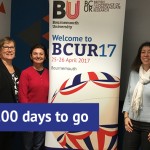“Relationship between teaching and research is amongst the most intellectually tangled, managerially complex and politically contentious issues in mass higher education system” (P.Scott 2005)
 I had the opportunity to organise a research dissemination event for our Digital Media Design Undergraduate students, opening the event to MA and PhD students. Different topics were presented with touching points of debates centred on “Arts design practice and politics of digital media. Dr. Veronica Barassi (Goldsmith), Paula Callus (BU) and Dr. Daniel Ploeger (Royal Central, School of Speech and Drama) were invited to present their research in front of undergraduate students, master and PhD students; as result a kaleidoscopic afternoon spent with our students, unfolded a common ground both in methodology and critical approach. Looking at media from cultural studies, anthropologic and artistic point of views was of great help to empower students’ willingness to create cultural links to their practice but also to feel part of an active and critic citizenship where a global culture is promoted continuously. I had the opportunity to organise a research dissemination event for our Digital Media Design Undergraduate students, opening the event to MA and PhD students. Different topics were presented with touching points of debates centred on “Arts design practice and politics of digital media. Dr. Veronica Barassi (Goldsmith), Paula Callus (BU) and Dr. Daniel Ploeger (Royal Central, School of Speech and Drama) were invited to present their research in front of undergraduate students, master and PhD students; as result a kaleidoscopic afternoon spent with our students, unfolded a common ground both in methodology and critical approach. Looking at media from cultural studies, anthropologic and artistic point of views was of great help to empower students’ willingness to create cultural links to their practice but also to feel part of an active and critic citizenship where a global culture is promoted continuously. |
We are all aware that research and teaching are often resolved into separate domains competing for time, resources and space.
On the other side embedding research into Undergraduate curriculum, shows greater involvement of the students, deeper understanding through inquiry-led learning.
A connection of research and teaching in academic work, makes university education distinctive and the potential to generate additional research output and new knowledge as well as the creation and strengthen pathways towards postgraduate research become incredibly natural (Giller 2011). Additionally I would mention the bidirectional sense of “gratitude” that derives from a learning experience when integrated into the culture of sharing knowledge.
Some feedback by attenders:
“Thank you for hosting a great insightful event regardless” [student, UG Level 6]
“This related to my topic for my dissertation and was very useful and insightful” [Digital Media Design student, UG Level 6]
“I found interesting how other cultures utilise technology to oppose Government actions especially in poorer countries where the technology might not have as much reach. It wasn’t directly relatable to my dissertation but it was still useful and interesting” [Digital Media Design student, UG Level 6]
“A lot of references to research for my own studies” [Digital Media Design student, UG Level 6]
“The idea I found most useful is how looking at new different art forms can be subversive” [Digital Media Design student, UG Level 6]
“Found interesting the concept of leisure time efficiency [in western culture], I would researching further into value of time” [student, UG Level 6]
“The idea of transgression, before I never thought to use my work as a tool for transgression. It really shows my privilege that it never crossed my mind and for all those Nigerian artists it’s probably the only way they can speak their mind about the social and political situation”. [Digital Media Design student, UG Level 6]
“Potentially would be good to divide lectures over three days or three weeks.” [Digital Media Design student, UG Level 6]
“Three hours was a little too long to concentrate for” [Digital Media Design student, UG Level 6]
Gill, P., 2011. Integrating Research into the Undergraduate Curriculum: A case study from Ireland. [online] Eua.be. Available from: http://www.eua.be/Libraries/eua-spring-conference-2011/Aarhus_WG1_Paul_Giller.pdf?sfvrsn=0 [Accessed 17 Nov. 2015].
Scott, P., 2005. Divergence or Convergence? The Links between Teaching and Research in Mass Higher Education. In Barnett, R. (2005). Reshaping the University: New Relationships between Research, Scholarship and Teaching. Maidenhead. Society for Research into Higher Education. Chpt 4. pp 53-66
 Only 100 days to go until BU welcomes hundreds of undergraduate students from all over the UK to showcase their research at BCUR17
Only 100 days to go until BU welcomes hundreds of undergraduate students from all over the UK to showcase their research at BCUR17










 No access to BRIAN 5-6th February
No access to BRIAN 5-6th February Missing Persons Indicator Project Recruitment
Missing Persons Indicator Project Recruitment Celebrating our Research: Postgraduate Research Showcase 2026
Celebrating our Research: Postgraduate Research Showcase 2026 Nursing Research REF Impact in Nepal
Nursing Research REF Impact in Nepal ECR Funding Open Call: Research Culture & Community Grant – Apply now
ECR Funding Open Call: Research Culture & Community Grant – Apply now MSCA Postdoctoral Fellowships 2025 Call
MSCA Postdoctoral Fellowships 2025 Call ERC Advanced Grant 2025 Webinar
ERC Advanced Grant 2025 Webinar Update on UKRO services
Update on UKRO services European research project exploring use of ‘virtual twins’ to better manage metabolic associated fatty liver disease
European research project exploring use of ‘virtual twins’ to better manage metabolic associated fatty liver disease